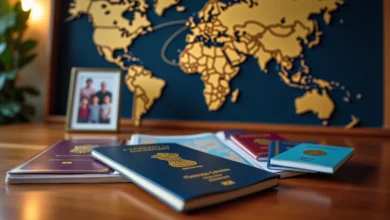
Dubai Car Accidents Plunge 90%, Sets New Safety Record
Dubai has set a new global standard in reducing car accidents. The death rate dropped by 93% from 2007 to 2023. This achievement places Dubai among the world’s top 10 safest cities for traffic. The city recorded just 1.6 deaths per 100,000 people in 2023, which beats international standards. The Roads and Transport Authority (RTA) and Dubai Police worked together to make Dubai a leader in road safety. They accomplished this despite more vehicles on the roads.
The city’s dedication to safety has not wavered. Traffic incidents rose from 3,945 in 2022 to 4,391 in 2023. Dubai uses smart traffic systems and strict traffic laws to work toward its goal of zero road deaths by 2050. Road safety becomes even more significant when young drivers between 19 and 29 make up 38% of deaths. This shows why targeted safety programs are needed.
Dubai Implements Revolutionary Traffic Management System

Image Source: Arabian Business
The Roads and Transport Authority (RTA) has transformed Dubai’s traffic management with a new system that changes how authorities monitor and enforce road safety. This tech upgrade helps prevent UAE Dubai car accidents by taking action before incidents happen rather than responding after the fact.
AI-Powered Cameras Detect Violations in Real-Time
Dubai Police uses advanced AI-powered radar systems on major roadways to track multiple traffic violations at once. These smart cameras accurately catch speeders, red-light runners, and dangerous drivers. The system spots aggressive driving patterns like tailgating, sudden lane changes, solid line crossings, and shoulder driving. These cameras can even catch distracted drivers by spotting hand movements and phone screens, while telling the difference between clothes and seat belts in poor visibility. Placing this technology in both commercial and residential areas has led to better driving habits.
Smart Sensors Monitor Driver Behavior
Dubai’s vehicle tracking goes beyond roadside cameras. Dubai Taxi Company’s AI tracks 14,500 drivers and 7,200 vehicles including taxis, limousines, and commercial transport. The RTA has also equipped over 5,000 heavy vehicles with smart devices that spot vehicle problems and monitor driver behavior from afar. These devices connect to RTA’s Smart Monitoring Center and flag violations like dangerous acceleration, sudden braking, and driving during restricted hours. This technology has made roads safer and reduced problems caused by commercial vehicles.
Automated Emergency Response Slashes Reaction Times
Dubai’s eCall system marks a major advance in emergency response. The system alerts the closest police station automatically during accidents and sends important details about the vehicle type, location, fuel type, and number of passengers. Response times have dropped by up to 40%, with teams arriving in just four minutes on average. The city has also started working on a next-gen traffic signal system that uses AI and digital twin tech. This should cut travel times and reduce intersection traffic by 10% to 20%.
UAE Law for Car Accidents Undergoes Major Overhaul

Image Source: Connector Dubai
UAE Dubai’s car accident handling has changed dramatically with recent Federal Traffic Law updates. These changes created one of the region’s most complete legal frameworks for road safety.
Stricter Penalties Target High-Risk Behaviors
The new laws bring tough penalties for dangerous driving. Drivers who leave an accident scene face up to one year in jail and fines from Dh50,000 to Dh100,000. Fatal accidents caused by negligence lead to jail time and minimum Dh50,000 fines. These penalties get tougher with at least one year in prison and Dh100,000 fines if drivers were caught in flooded valleys. Anyone driving under alcohol or drug influence loses their license for at least six months. Courts can also impose fines and jail time. The rules are even stricter for repeat offenders – three strikes and your license is gone forever.
New Legal Framework Streamlines Accident Reporting
The system now makes accident reporting easier. Drivers can report minor accidents through Dubai Police’s mobile app in just three minutes. The app sends accident reports by SMS within 24 hours. Accidents with injuries need immediate 999 calls, and drivers must stay put. In other cases, drivers should move their vehicles to avoid traffic jams. A Dh500 fine awaits those who don’t move after minor accidents. Last year, authorities fined nearly 20,000 drivers for stopping in roads without good reason.
Insurance Regulations Incentivize Safe Driving
New insurance rules push for better driving habits. Driving without insurance costs Dh500, adds four black points, and might get your car impounded for a week. Insurance companies can deny claims if drivers were drunk, didn’t have proper papers, or misused their vehicles. Many providers now send instant claim confirmations and updates through SMS and email. Dubai’s White Points program rewards safe drivers who avoid traffic violations, Salik fines, and legal troubles all year.
Government Launches Multi-Phase Safety Initiative

Image Source: Middle East Briefing
UAE Dubai car accidents have seen a reduction through a detailed multi-phase safety strategy that focuses on working together and education. The Roads and Transport Authority (RTA) and Dubai Police executed 53 joint initiatives in 2024 alone. These efforts have substantially improved the emirate’s safety record.
Public-Private Partnerships Drive Breakthroughs
The UAE government believes that environmentally responsible safety improvements need strong partnerships between public authorities and private enterprises. These partnerships now span multiple sectors with projects valued at approximately AED 40 billion across 30 major initiatives. RTA worked with 32 partners from both public and private sectors to improve service integration in 2024. This resulted in improvements to 71 services that users can now access without prior requirements.
The Abu Dhabi Traffic and Patrols Directorate created the groundbreaking Smart Driver Program, the first of its kind globally. This trailblazing application lets motorists monitor vehicle speed and compare it with posted limits throughout their experience. The system connects to a smart database that updates driver rankings after each trip. Top-performing motorists become eligible for monthly prizes of 10,000 AED.
Educational Campaigns Reshape Driver Attitudes
Educational initiatives have proven vital in changing driver behavior, complementing technological solutions. Eight targeted awareness campaigns reached over 255,000 people in 2024. The 24 educational videos highlighting traffic violation consequences got more than 117 million views.
RTA and Dubai Police conducted 19 site visits to truck rest areas for commercial drivers. They hosted 85 awareness workshops targeting delivery riders and engaged more than 15,000 drivers. The pedestrian safety campaigns reached over 10,000 workers and vehicle drivers effectively.
The Ministry of Interior launched its fourth quarterly traffic campaign of 2024 titled “Traffic Safety for School Students” with the new academic year. Traffic patrols increased around schools to manage traffic flow and prevent congestion. This ensures safe transportation for students.
Data Analytics Reveals Key Factors Behind Safety Success

Image Source: Global Media Insight
Dubai’s dramatic reduction in road accidents stems from a smart data analytics system that spots dangerous patterns and helps create targeted solutions. Studies show that human errors cause most accidents. Speeding accounts for 12%, sudden turns make up 22%, and poor road awareness contributes to 12% of these incidents.
Accident Hotspots Receive Targeted Interventions
RTA’s GIS-based Dubai Integrated Accident Management System (DIAMS) has transformed safety management. The system identifies dangerous locations five times faster than older methods. It pinpoints general, pedestrian, and heavy vehicle blackspots and develops economical solutions through benefit analysis. Sheik Mohammed Bin Zayed Road shows remarkable results – fatalities dropped from 34 to 12 per 100,000 people. Emirates Road also improved with numbers falling from 27 to 20.
Demographic Analysis Shapes Tailored Safety Programs
Live data has revealed significant insights that shape targeted safety programs. Research shows that one in three Dubai’s car accident victims are in their twenties, which calls for age-specific programs. The analysis of driving patterns reveals that 40% of distracted drivers in crashes were using phones. RTA responded by launching educational campaigns that target high-risk behaviors among specific groups like children, students, cyclists, and scooter riders.
Real-Time Traffic Flow Optimization Reduces Congestion-Related Crashes
AI-powered traffic systems have significantly reduced accidents caused by congestion. UTC-UX Fusion system blends predictive analytics and digital twin technology to cut intersection congestion by 10-20%. Abu Dhabi’s SCOOT system uses thousands of sensors to track traffic volumes at junctions. These sensors detect vehicle flow, numbers, and average speeds near traffic signals. LiDAR technology delivers up to 95% accuracy in road asset evaluation, which helps authorities spot infrastructure problems before they cause accidents.
International Experts Study Dubai’s Road Safety Model
Dubai’s road safety success has caught global experts’ attention. The emirate now stands in the international spotlight as other regions try to imitate its effective approach to reducing UAE Dubai car accidents.
WHO Recognizes Dubai’s Achievement as Global Standard
The International Road Federation (IRF) awarded Dubai’s Roads and Transport Authority (RTA) the prestigious Traffic Management and Intelligent Transportation Systems Award. RTA earned this honor for its innovative Intelligent Traffic Systems Center. This recognition highlights Dubai’s excellence in using advanced technologies that help mobility and improve response times to road accidents. The award considered smart systems, artificial intelligence, big data analytics, and Internet of Things applications.
RTA has achieved something remarkable by winning the Prince Michael International Road Safety Award three times (2013, 2016, and 2020). They became the first government body outside the United Kingdom to reach this milestone. This unique recognition came after Dubai cut road fatalities to 2.3 cases per 100,000 population. The numbers improved further to just 1.6 deaths per 100,000 people in 2023.
The World Economic Forum’s Global Competitiveness Report placed Dubai at the top position globally for road quality. These achievements have made Dubai a model for tackling the global road safety crisis that claims about 1.2 million lives each year worldwide.
Neighboring Countries Begin Using Similar Approaches
Gulf region countries now implement strategies inspired by Dubai’s success. Saudi Arabia launched the National Road Safety Center as part of its Vision 2030 initiative. The center works to improve standards through coordination with academic institutions and industry stakeholders. Their work led to a 6.8% drop in major crashes in 2022 compared to 2021, with a 2.1% decrease in road fatalities.
A report by Strategy& Middle East and the Fédération Internationale de l’Automobile shows GCC countries could save 2,800 lives yearly—a 22% reduction in road fatalities—by meeting key UN safety targets. This approach could add AED 917.99 billion to regional economies over the next two decades.
Abu Dhabi has also adopted parts of Dubai’s framework. The emirate uses the SCOOT central traffic control system with sensors to count vehicles at signals and improve traffic flow at major junctions. Both emirates now use adaptive traffic control systems that serve as models for urban centers across the Middle East.
Dubai has transformed its road safety through strategic vision and innovation. The city reduced traffic fatalities to 1.6 deaths per 100,000 people, which shows its integrated approach works well. AI-powered monitoring systems, strict legal enforcement, and analytical insights have built a framework that promotes road safety excellence.
These initiatives have delivered more than just better statistics. Dubai has created a culture of responsible driving among its residents with strategic collaborations and targeted educational campaigns. The city’s innovative traffic management solutions now guide other metropolitan areas worldwide.
Dubai aims to achieve zero road fatalities by 2050. The city continues to refine its smart traffic systems and legal framework while strengthening its position as a global leader in road safety. Dubai’s progress from concerning accident rates to world-class safety standards shows how determined leadership and technological advancement can reshape urban mobility for future generations.






